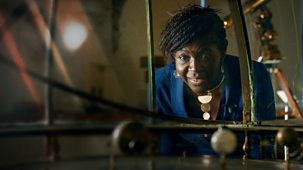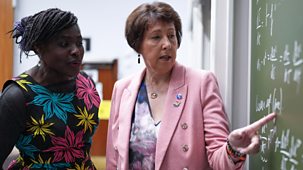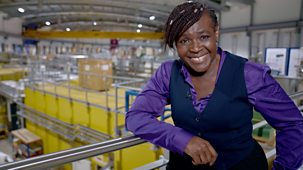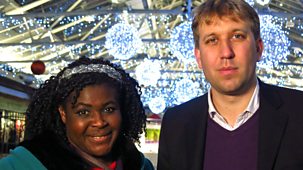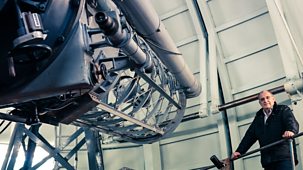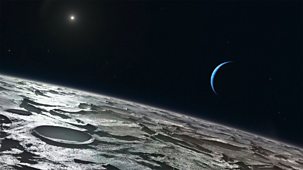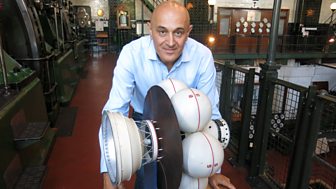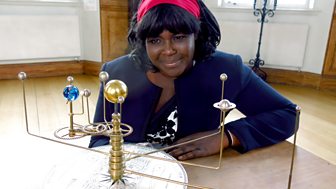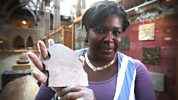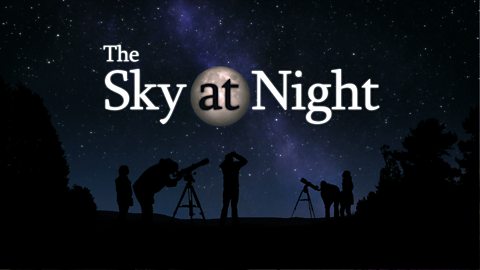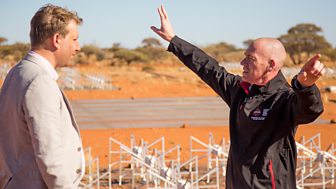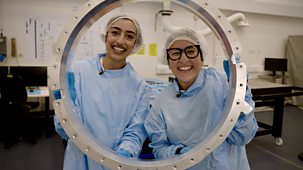
2075: Our Place in Space
The Sky at Night is embarking on a journey into the future as we explore how space will revolutionise life on Earth over the next 50 years. As humanity's reach extends into the cosmos, we face unprecedented challenges, from redefining what it means to be an astronaut to confronting our own space junk and dealing with the impact of life in space on our Earth-adapted bodies. With privileged early access to a groundbreaking new report from the Royal Society on humanity’s future in space, the Sky at Night team are on a mission to find our destiny among the stars – our place in space.\n\nThe criteria for becoming an astronaut are famously tough. But if we want more people to go to space, maybe it’s time to start challenging it. That’s what the European Space Agency are doing with their pioneering study Fly!, which aims to figure out if someone with a physical disability can live and work in space. At the European Astronaut Centre in Cologne, presenter Chris Lintott meets one of the newest members of ESA’s astronaut reserve: John McFall. John is already a medal-winning Paralympian and orthopaedic surgeon, and – as if that wasn’t enough – he is now the first recruit to the Fly! study. Chris discovers what’s involved in John’s extensive and gruelling training, and finds out what his hopes are for improving access to space.\n\nTraining for space travel is one thing, but living on the moon or Mars is a whole new level for humanity. Our bodies are used to gravity, and being in environments with less gravity than Earth can make them go a bit haywire. At the Royal Society in London, Maggie Aderin-Pocock meets up with space medicine expert Professor Kevin Fong to find out all about the challenges of keeping humans healthy in space. What would an astronaut on Mars do in a medical emergency? What happens to our bones, muscles and organs if we are without Earth’s gravity for a long time? And could a baby be born in space?\n\nWhile Maggie and Kevin unpack those mind-bending questions, George Dransfield heads to Astroscale in Oxfordshire, a company who are coming up with clever ways to take out space trash. There are already 130 million pieces of space debris in orbit around our planet, and that number is ticking up. George meets up with Dr Mekhi Dhesi to learn about Astroscale’s clever missions to clean up space junk – including ELSA-M, a spacecraft which uses magnets to tow defunct satellites out of orbit, and Cosmic, a spacecraft with a robot arm to grab onto debris.\n\nOur increasing dependence on satellites isn’t just producing a lot of space junk though, it’s also becoming a nuisance for amateur astronomers around the world. Thankfully, our resident astronomer Pete Lawrence has some clever tips and tricks for telling satellites and meteors apart, and using smart telescopes to remove satellite trails from deep sky images.\n\nFinally, back at the Royal Society, Maggie sits down with Professor Suzie Imber, planetary scientist and co-chair of the groundbreaking new Space: 2075 report. Together, they unpack some of the biggest questions about our journey into the cosmos over the next 50 years. How do we make sure space benefits us all, including those of us still down here on Earth? Should we be concerned about the commercialisation of space travel? And will there really be people on Mars by 2075?
Source: BBC 4
Most recent episodes of The Sky at Night
The Sky At Night
Ancestral Skies
This month, The Sky at Night teams up with BBC Ideas to discover the secrets of archaeology and astronomy and to reflect on our ancestral skies. \n\nThroughout history and acros ...
14-11-2024
BBC 4
The Sky At Night
Question Time Special
Get ready for The Sky at Night’s annual Question Time Special, where viewers get the opportunity to ask the questions they have always wanted answered about our universe.\ ...
08-10-2024
BBC 4
The Sky At Night
2075: Our Place In Space
The Sky at Night is embarking on a journey into the future as we explore how space will revolutionise life on Earth over the next 50 years. As humanity's reach extends into the ...
11-09-2024
BBC 4
The Sky At Night
Nicky, Nasa And The Next Frontier
In this Sky at Night special, the team talk to Dr Nicola Fox, NASA’s head of science, whose life began in the UK.\n\nPresenter Chris Lintott chats to Nicky about her early ...
15-08-2024
BBC 4
The Sky At Night
Webb Telescope: The Story So Far
In July 2022, the James Webb Space Telescope released its first images. They were visually stunning, and it was clear they provided more detail of stars, galaxies and planets th ...
11-07-2024
BBC 4
The Sky At Night
Cosmic Ghosts
This month, The Sky at Night has a spooky twist. Across the universe, there are hidden objects that we can’t see, but astronomers and scientists still believe they’r ...
13-06-2024
BBC 4
The Sky At Night
Hiding In Starlight
Total solar eclipses, like the one seen last month in North America, allow us to see details of the Sun that can’t be seen at any other time. So, this month, The Sky at Ni ...
16-05-2024
BBC 4
The Sky At Night
Space Rock Return
The Sky at Night is back for a brand new series, and this month it is delving into Nasa’s OSIRIS-REx mission, which last year brought back a sample from the near-Earth ast ...
11-04-2024
BBC 4
The Sky At Night
The Sky At Night Meets The Infinite Monkey Cage
In this special episode to mark the end of another season of The Sky at Night, we team up with Radio 4’s The Infinite Monkey Cage to talk all things amateur astronomy. Joi ...
16-11-2023
BBC 4
Most popular episodes of The Sky at Night
The Sky At Night
Nicky, Nasa And The Next Frontier
In this Sky at Night special, the team talk to Dr Nicola Fox, NASA’s head of science, whose life began in the UK.\n\nPresenter Chris Lintott chats to Nicky about her early ...
15-08-2024
BBC 4
The Sky At Night
Telescopes Through Time
The Sky at Night team explore the history of the telescope – from Harriot and Galileo's lunar observations to the Hubble and James Webb space telescopes – revealing ...
18-11-2021
BBC 4
The Sky At Night
Question Time Special
Get ready for The Sky at Night’s annual Question Time Special, where viewers get the opportunity to ask the questions they have always wanted answered about our universe.\ ...
08-10-2024
BBC 4
The Sky At Night
The Search For Alien Life
The Sky at Night team investigate the latest science in the hunt for extraterrestrial life. Scientists have never been more obsessed with finding aliens than they are right now. ...
13-04-2023
BBC 4
The Sky At Night
The Forgotten Solar System
Of the 100 probes that have been sent out into space, only one probe - Voyager 2 in 1989 - has ever sent back any information about the solar system's outer planets. From afar, ...
12-10-2021
BBC 4
The Sky At Night
Impacts
The team looks at the cosmic impacts which have shaped the universe around us, from asteroids crashing into the surface of the moon to galaxies colliding with each other.
15-06-2014
BBC 4
The Sky At Night
Guides: 2. Galaxies
Galaxies are the building blocks of the universe. Our solar system sits inside a huge galaxy that we call the Milky Way - home to as many as 300 billion stars. But the Milky Way ...
11-08-2019
BBC 4
The Sky At Night
Outback Astronomy
In February 2018, news broke that astronomers had seen the cosmic dawn - the moment when stars first formed, flooding the universe with light. What's remarkable is that this inc ...
12-07-2018
BBC 4


